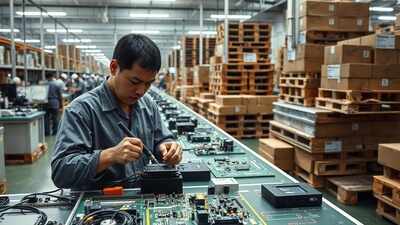Manufacturing setback: India’s electronics sector faces twin blow from import curbs on gold compounds, rare earths; industry warns of supply disruption
India’s electronics manufacturing industry is grappling with mounting pressure as recent restrictions on gold compound imports have compounded the sector’s ongoing struggle with China’s export curbs on rare earth magnets. As per news agency PTI, industry groups have warned that the dual hit could disrupt production lines, delay investments, and weaken India’s push for electronics self-reliance under schemes like Make in India and PLI.Gold compounds, especially Potassium Gold Cyanide, are essential in manufacturing high-end electronic components such as semiconductors, printed circuit boards, and connectors, due to their superior conductivity. However, the Directorate General of Foreign Trade (DGFT), in a June 17 order, moved these imports from the “free” to the “restricted” category.According to the India Cellular and Electronics Association (ICEA), the sudden policy shift has caused “uncertainty in ongoing efforts to scale up electronics manufacturing,” especially in sub-assemblies that rely on gold-based plating materials. “This unpredictability could deter investment,” ICEA chairman Pankaj Mohindroo warned in a letter to the ministry of electronics and IT, reported news agency PTI.Echoing these concerns, Elcina secretary general Rajoo Goel said customs authorities have begun holding consignments of gold-based compounds, resulting in “significant delays to production lines.” He emphasised that these materials are used strictly for manufacturing, not bullion trading, and in trace amounts only.Elcina cautioned that such import hurdles threaten the objectives of the Electronics Component Manufacturing Scheme (ECMS), PLI, and SPECS. “The import restriction will adversely impact the ease of doing business for component manufacturers,” the body said.This challenge comes on top of China’s export curbs on rare earth elements like terbium and dysprosium, key for manufacturing NdFeB magnets used in electronics, EVs, and wind turbines. As per PTI, over 21,000 jobs are at risk in Noida and South India’s audio electronics segment alone due to these restrictions.Moreover, electronics firms face delays in importing specialised capital goods from China, with companies like iPhone-maker Foxconn recently forced to withdraw Chinese engineers from its Tamil Nadu facility, affecting production schedules.According to the Global Trade Research Initiative (GTRI), China’s export restrictions now extend to gallium, germanium, graphite, and other critical minerals. GTRI founder Ajay Srivastava said these moves expose India’s deep strategic vulnerabilities and urged the government to launch reverse-engineering initiatives to cut reliance on Chinese inputs.“India must act swiftly to reduce Chinese import dependence,” Srivastava said, calling for industrial labs to develop local substitutes for top imported products.With imports from China rising and exports falling, India’s trade deficit with Beijing has widened to $100 billion in FY25. Over 80 per cent of India’s needs in laptops, solar panels, antibiotics, and lithium-ion batteries continue to be met by Chinese firms.As the sector calls for urgent government intervention, the electronics industry warns that unless bottlenecks around raw materials and capital goods are cleared, India’s ambitions of becoming a global electronics manufacturing hub could face serious setbacks.









Post Comment